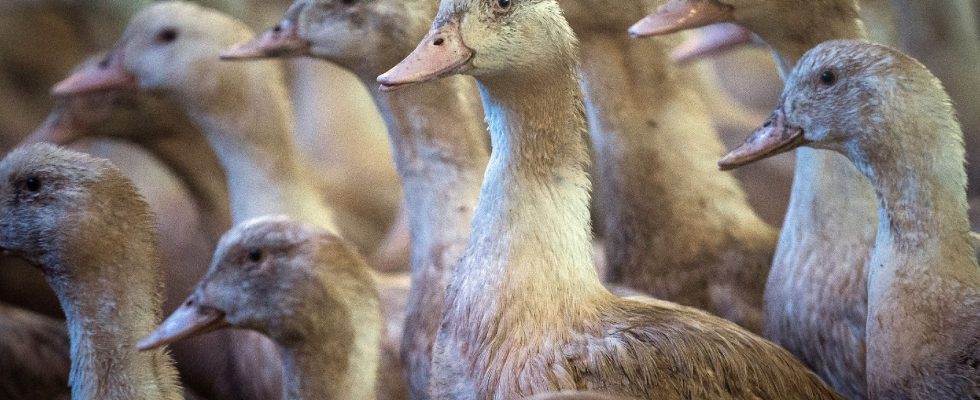It is not just Covid that requires large-scale vaccination plans. From this Monday, the preventive vaccination campaign against the avian flu virus begins for French ducks, after having been officially made compulsory this Sunday, October 1. To launch this unprecedented plan in Europe, the Minister of Agriculture Marc Fesneau chose to travel to Horsarrieu today, in the Landes, to the first farm concerned.
In total, the profession is counting on nearly 64 million ducks which will have to be vaccinated by the summer of 2024. However, not all breeders are concerned: the program targets farms with more than 250 ducks in mainland France (excluding Corsica). ), whether they are raised for foie gras, breast and confit (mulard ducks) or to be sold in the form of fillets and/or aiguillettes (mainly Muscovy ducks).
A first order of 80 million vaccines
On a practical level, this vaccination concerns young ducklings that have just arrived on the farms. The injection is given on the 10th and then on the 28th day of the duck’s life. Veterinarians will supervise the campaign (orders, traceability, etc.) but will rarely carry out the injection: this task will fall to the breeder, any employees and technicians from service provider companies.
While the Netherlands tested vaccination on chickens or Italy on turkeys, France is the first European country to implement a campaign of this scale on ducks, which are particularly susceptible to avian flu. A first order for 80 million vaccines was placed with the German laboratory Boehringer Ingelheim. But at a rate of two doses per webfoot, this will not be mathematically enough. Paris will therefore have to launch another call for tenders in order to be able to complete its campaign.
A 100 million euro campaign
The cost of this vaccination plan is far from negligible. This first campaign, which is due to last until the summer of 2024, is expected to cost nearly 100 million euros. The State will cover 85% of expenses, and the remaining 15% will remain the responsibility of the production sectors. But these expenses remain far below the damage that avian flu can cause. Indeed, when a case occurs, poultry are slaughtered, preventive euthanasia is decided on nearby farms, production is permanently disrupted and economic losses accumulate. Thus, the 2021-2022 epidemic had, for example, cost at least 650 million euros to public finances, in particular to compensate breeders whose animals were euthanized. If the amount is not known for the period 2022-2023, it should also remain higher than the cost of this vaccination campaign.
Enough to motivate the sector to accelerate the prevention of this epidemic. Especially since now, breeders who have not vaccinated their ducks will no longer be compensated in the event of stamping out. “We are in working order”, reports to AFP Marie-Pierre Pé, director of the organization which brings together foie gras professionals (Cifog), even if the latter nevertheless fear running out of hands given the scale of the task. “The pressure of the virus remains strong but vaccination should make it possible to stay on one-off cases and avoid the tidal wave” in farms, adds to AFP Jocelyn Marguerie, president of the avian commission of the association of veterinarians practicing in livestock farming, SNGTV.
Nevertheless, poultry professionals are monitoring the reaction that the launch of this campaign could cause on export markets, often wary of a country that vaccinates on the grounds that the virus could continue to circulate quietly. . Thus, an official from the Japanese Ministry of Agriculture told AFP that Tokyo would suspend imports of French poultry products when vaccination begins.
